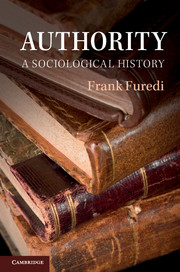Book contents
- Frontmatter
- Contents
- Preface
- Introduction: always in question
- 1 Thersites and the personification of anti-authority
- 2 Socrates and the quest for authority
- 3 Rome and the founding of authority
- 4 Augustus: a role model for authority through the ages
- 5 Medieval authority and the Investiture Contest
- 6 Medieval claim-making and the sociology of tradition
- 7 Reformation and the emergence of the problem of order
- 8 Hobbes and the problem of order
- 9 The rationalisation of authority
- 10 The limits of the authority of the rational
- 11 Taming public opinion and the quest for authority
- 12 Nineteenth-century authority on the defensive
- 13 Authority transformed into sociology's cause
- 14 The rise of negative theories of authority
- 15 By passing authority through the rationalisation of persuasion
- 16 In the shadow of authoritarianism
- Conclusion: final thoughts
- Bibliography
- Index
3 - Rome and the founding of authority
Published online by Cambridge University Press: 05 June 2014
- Frontmatter
- Contents
- Preface
- Introduction: always in question
- 1 Thersites and the personification of anti-authority
- 2 Socrates and the quest for authority
- 3 Rome and the founding of authority
- 4 Augustus: a role model for authority through the ages
- 5 Medieval authority and the Investiture Contest
- 6 Medieval claim-making and the sociology of tradition
- 7 Reformation and the emergence of the problem of order
- 8 Hobbes and the problem of order
- 9 The rationalisation of authority
- 10 The limits of the authority of the rational
- 11 Taming public opinion and the quest for authority
- 12 Nineteenth-century authority on the defensive
- 13 Authority transformed into sociology's cause
- 14 The rise of negative theories of authority
- 15 By passing authority through the rationalisation of persuasion
- 16 In the shadow of authoritarianism
- Conclusion: final thoughts
- Bibliography
- Index
Summary
The idea of political authority gained shape and definition during the evolution of the Roman Republic. Although the meaning of political concepts are subject to historical variations, it is in Rome that many themes and problems associated with the modern understanding of authority – tradition, religion, morality, competing visions of the past – emerged with force. As one review of the history of this idea concluded:
There is common agreement that the idea of authority, in the full range of meanings that have given it an integral intellectual life to the present, has its origins during the Roman Republic with the coinage of the distinctive term, auctoritas, to cover several kinds of primarily, albeit not exclusively legal relationships.
Roman society was no less subject to the upheavals brought by change than the Greek city states. However, as Arendt notes, while Greek philosophy tended to take change for granted, the Romans expressly attempted to consolidate a powerful sense of tradition and continuity. The Romans continually wrote about their past and were self-consciously devoted to their ancestors, traditions and customs. This played an important role in the construction of a unique Roman sensibility towards authority.
But the social upheavals brought about through imperial expansion, competition and rivalry within the ruling elites and unrest from below meant that Romans could not take authority for granted. Questions to do with who had authority and how it should be exercised dominated public life during the final two centuries of the Republic. Such questions were posed with increasing urgency during a series of civil wars that threatened the very integrity of Roman political institutions.
- Type
- Chapter
- Information
- AuthorityA Sociological History, pp. 47 - 69Publisher: Cambridge University PressPrint publication year: 2013



